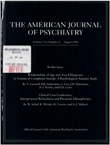Alcohol dependence and anxiety disorders: what is the relationship?
Abstract
OBJECTIVE: In this critical review the authors evaluate the literature regarding the relationship between lifelong DSM-III-R anxiety disorders and alcohol dependence. Many alcohol-dependent individuals demonstrate severe anxiety symptoms in the context of acute or protracted abstinence syndromes, but it is unclear whether these anxiety conditions are independent psychiatric disorders or temporary syndromes likely to disappear on their own. METHODS: Reports since 1975 describing the relationship between alcoholism and anxiety disorders were reviewed to determine whether 1) lifelong anxiety disorders are unusually prevalent among alcohol-dependent individuals, 2) children of alcoholics are more likely to develop anxiety disorders than comparison populations, 3) anxiety syndromes are likely to disappear with abstinence, 4) the rate of alcohol dependence among subjects with lifelong anxiety disorders is higher than normal, 5) there is familial crossover between alcohol dependence and anxiety disorders, and 6) alcoholism is often preceded by anxiety disorders in groups from the general population studied prospectively. RESULTS: The interaction between alcohol use and anxiety disorders is complex. The available data, while imperfect, do not prove a close relationship between life- long anxiety disorders and alcohol dependence. Further, prospective studies of children of alcoholics and individuals from the general population do not indicate a high rate of anxiety disorders preceding alcohol dependence. CONCLUSIONS: The high rates of comorbidity in some studies likely reflect a mixture of true anxiety disorders among alcoholics at a rate equal to or slightly higher than that for the general population, along with temporary, but at times severe, substance-induced anxiety syndromes.
Access content
To read the fulltext, please use one of the options below to sign in or purchase access.- Personal login
- Institutional Login
- Sign in via OpenAthens
- Register for access
-
Please login/register if you wish to pair your device and check access availability.
Not a subscriber?
PsychiatryOnline subscription options offer access to the DSM-5 library, books, journals, CME, and patient resources. This all-in-one virtual library provides psychiatrists and mental health professionals with key resources for diagnosis, treatment, research, and professional development.
Need more help? PsychiatryOnline Customer Service may be reached by emailing [email protected] or by calling 800-368-5777 (in the U.S.) or 703-907-7322 (outside the U.S.).



